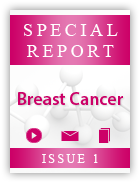Trials Seek Optimal nab-Paclitaxel Regimen for First-Line Use in TNMBC
An ongoing clinical trial will determine whether the addition of weekly nab-paclitaxel to gemcitabine or carboplatin improves PFS versus the gemcitabine-carboplatin doublet as first-line therapy for patients with metastatic TNBC.
Denise A. Yardley, MD
An ongoing clinical trial will determine whether the addition of weekly nab-paclitaxel to gemcitabine or carboplatin improves progression-free survival (PFS) versus the gemcitabine-carboplatin doublet as first-line therapy for patients with triple-negative metastatic breast cancer (TNMBC).
Still in the patient-accrual stage, the phase II/III trial will involve a cumulative total of almost 800 patients with untreated TNMBC,Denise A. Yardley, MD, a medical oncologist at Sarah Cannon Research Institute in Nashville, Tennessee, and colleagues reported in a poster presentation at the San Antonio Breast Cancer Symposium (SABCS) 2014.
During the phase II portion of the study, investigators will enroll 240 patients, who will be randomized to nab-paclitaxel 125 mg/m2plus gemcitabine 1000 mg/m2or carboplatin AUC 2 or to the gemcitabine-carboplatin doublet. The primary objectives are to evaluate the safety and efficacy of the nab-paclitaxel regimens and to identify the nab-paclitaxel doublet to carry forward into the phase III trial. The primary endpoint of phase II is investigator-assessed PFS.
The phase III investigation will compare the nab-paclitaxel regimen chosen from phase II with the gemcitabine-carboplatin doublet in 550 patients. The primary endpoint is PFS as assessed by independent radiology review.
Eligible patients have pathologically confirmed triple-negative breast cancer at screening and measurable disease and estrogen and progesterone receptor expression <1%, and are HER2 negative as defined by immunohistochemistry (IHC) 0 or +1, fluorescent in situ hybridization (FISH) negative, or IHC+2 and FISH negative. Patients must have received adjuvant or neoadjuvant anthracycline therapy (unless ruled out by treating physician) or an alternative adjuvant/neoadjuvant regimen, but they must not have undergone prior therapy for metastatic disease.
“Biomarker analyses may advance the current understanding of triple-negative breast cancer biology and response to treatment,” Yardley and colleagues noted in their SABCS poster presentation. “This study may identify a nab-paclitaxelbased cytotoxic chemotherapy combination as a new first-line standard treatment regimen for triple negative metastatic breast cancer.”
According to a representative for study sponsor Celgene, the phase II component of the trial should be completed during 2015 in time for reporting by the end of the year.
<<<
